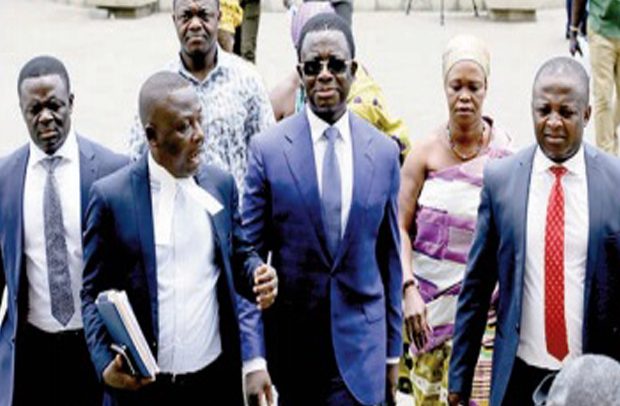Dr. Stephen Opuni
The Court of Appeal has set July 3, 2023, to decide whether or not the trial of former Chief Executive Officer of Ghana Cocoa Board (COCOBOD), Dr. Stephen Opuni and businessman Seidu Agongo, charged for causing financial loss to the state ought to start afresh.
A three-member panel of the court presided over by Justice Philip Bright Mensah and assisted by Justices Jennifer Dadzie and Ernest Owusu-Dapaa, yesterday dismissed an application asking it to order the Registrar of the High Court to transfer the full records of the proceedings previously presided over by retired Justice Clemence Honyenuga.
According to the court, the records before it are material enough to determine the Attorney General’s appeal against the decision of an Accra High Court presided over by Justice Kwasi Anokye Gyimah to start the trial afresh instead of adopting the old proceedings and continue with same.
The court, ruling on application by counsels for the accused persons asking it to order the registrar to transfer the full records, indicated that the appeal before it is an interlocutory appeal and the materials relevant for the determination of the appeal would be both prosecution and defence counsels’ submissions, the trial judge’s ruling on the submissions as well as the charge sheet, which are all before the court.
It, therefore, declined the request by the defence counsels to order the registrar to transfer the full records and ordered the prosecution to file its written submission by June 16, 2023, while the defence counsels were given a week after that to file their written submissions. The substantive appeal was adjourned to July 3, for judgment.
Dr. Opuni and private businessman, Seidu Agongo, are accused of causing over GH¢217 million financial loss to the state and have been on trial at an Accra High Court since March 2018, charged with 27 offences.
Justice Kwasi Anokye Gyimah, the new judge assigned to the case following the retirement of Justice Honyenuga, ruled that it would be proper to start the case afresh because he did not want to be saddled with the same suspicions and allegations of unfairness levelled against the current state of proceedings.
The Attorney General, however, filed an appeal against the decision, arguing that “the decision of the court to start the trial de novo (afresh) has occasioned a miscarriage of justice as it will hinder an efficient trial of the accused persons in the instant case.”
Before the case is heard, Samuel Cudjoe, counsel for Dr. Opuni, in an oral application last week indicated that the records before the court have missing pages.
They argue that the registrar is enjoined by law to transfer the full records and an absence of the full records will negatively affect the determination of the appeal leading to a miscarriage of justice on their clients.
The application was opposed by Mr. Dame, who argued that the application is totally unsupported by any rule of procedure so far as proceedings before the Court of Appeal are concerned.
He said in a record containing over 4,000 pages, the omission of about 25 pages cannot be said to be of substantial prejudice to the case of the respondents or accused persons.
“It was incumbent on the respondent to demonstrate how the omission of these 25 pages out of over 4,000 pages harms the case of the respondents or materially disabled the respondents from contesting this appeal. They did not demonstrate at all how each of the pages omitted affects the accused persons beyond the allegations,” Mr. Dame added.
He said the subject matter of the appeal is a determination of the simple question whether the trial ought to commence afresh or the trial judge ought to adopt the proceedings.
BY Gibril Abdul Razak


